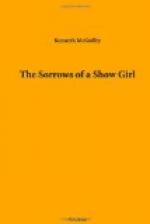“Tell me, do you think it’s good form for a lady to have her wedding announcement accompanied by pictures of herself in tights. Wilbur says that it won’t help me, but it will do the show a lot of good, and he says somebody connected with my show should be done good besides the manager.
“I will say one good word about our show—it has a grand first act. The other two acts may be on the cheese, but the first act is good. The author says the first act of a show is the only one that needs any attention, because it is the only one the critics ever stick for anyway. We got great scenery; the second act is made of what you might call a composite set, being composed out of all the scenery from the other failures this year.
“Did I say other failures?”
“I spoke inadvertently. ’For this elaborate production, with its all-star cast of metropolitan favorites and its famous beauty chorus,’ as Wilbur says, may be all right.
“Mind you, I only say may.
“The first act is laid in a quince plantation, and the quinces of the chorus are discovered at curtain rise picking the luscious fruit. There is a naval vessel in the harbor. This was put in so the tenor could wear his white duck uniform; he had to wear something, and when the management found that he had a white duck uniform—every tenor has, you know, or he wouldn’t be a tenor—when the management found that he had a uniform they took the money they had advanced for costumes away from him and rewrote the first act.
“As I say, we lemons are picking quinces or we quinces are picking lemons, any way you want to take it, and after finishing the opening chorus we rush up stage, open center, and in comes the prima donna in a pony cart—a stone boat would suit her better, but that is neither here nor there—see pony cart, chance for number by pony ballet, with six trained doughnuts—you see that’s where the title of the play is introduced. That’s the only time the title shows up except a duet between the leading lady and the tenor entitled ’I Had Rather be a Doughnut in Harlem Than a Butter Cake in Childs’.’
“The prima and the tenor do an imitation of the ‘Merry Widow’ waltz. The author didn’t want that put in, but the backer of the show convinced him that nowadays every true musical comedy had an imitation of the ’Merry Widow’ waltz, so he let it slide.
“After that in comes the comedian as the valet of a wealthy American just arrived on the battleship.
“He has got a great entrance. It’s brought out by some plot lines spoken by two of the chorus girls that he has taken a taxaballoon from the boat and while up in the air he bites the rope of the balloon in two in a fit and falls center stage with a red spotlight on him. That’s the musical cue for his song.
“‘I’d Rather Be Up in the Air Than Up in the Bronx.’ He has learned twenty-two extra verses and says that he will give them all if the ushers’ hands hold out.




